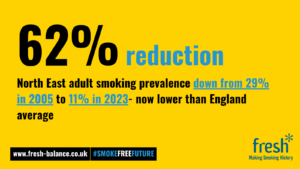North East smoking rates fall to second lowest in the country
Fresh has welcomed new figures out today showing a record low in adult smoking rates – and for the first time, rates in the North East are lower than the England average and the second lowest in the country.


The latest figures published by the Office for National Statistics show that adult smoking rates in the North East have fallen from 13.1% in 2022 to 11% in 2023. This compares to 11.6% in England.
Nationally, the North East has seen the largest fall in adult smoking since 2005 when 29% of adults in the region were smoking (the highest rate in the country), compared to 11% in 2023. This is a 62% reduction overall and means that smoking rates in the North East are now the second lowest in the country.
However, Fresh is calling for the efforts to be maintained, as smoking-related illness remains high and smoking rates are much higher in certain groups including people with mental illness and those living in poorer communities.
The figures come as Fresh re-launches its Smoking Survivors campaign, which is supported by local authorities and NHS partners to encourage thousands more in the region to quit. It also comes as discussions continue nationally around creating a Smokefree Future for the next generation by raising the age of sale.
Despite the fall in the smoking rate, 18% of adults aged 18-64 still smoke in the region compared to 19.5% in England. Smoking remains the region’s leading cause of health inequalities, the biggest cause of cancer, and the largest cause of preventable deaths. It also costs the region an estimated £2.35 billion every year.
Ailsa Rutter OBE, Director of Fresh and Balance, said: “These figures show the impact of local authorities and the NHS working together with Fresh to take action on our biggest cause of ill health and premature death. Smoking rates are now down to record-low levels in the North East and for the first time lower than in England. From a region where smoking was embedded for many as a way of life, this is not something we could have imagined 20 years ago – it has taken collective efforts and a vision that our people don’t deserve to die 10 years earlier from smoking, nor face a lifetime of addiction.
“It is a huge credit to partners in our region’s local authorities and the NHS that reducing smoking has been made a top priority and reinforces the goal of eliminating the harm from smoking for good. Year-round campaigns raise motivation to quit and ensure smokers have access to support as part of a comprehensive tobacco control programme is lifesaving. We are proud of the collaboration over many years on a comprehensive approach to reducing smoking and our clear vision that death and disease from tobacco smoking need to become a thing of the past, once and for all.”
Ailsa added: “Smoking is still our number one killer and rates are much higher in key groups including people with mental illness and those living in poorer communities. Rates of lung cancer are still rising among women. We still need concerted action now at local, regional and national levels to reduce adult smoking to 5% by 2030.”
Amanda Healy, Durham County Council’s Director of Public Health and Chair of the Association of Directors of Public Health North East Forum, said: “Most people who smoke start as children and may make several quit attempts. Tobacco related disease is still linked entirely to the health inequalities that we face – it is more common among people with lower incomes. The more disadvantaged someone is, the more likely they are to smoke and to suffer from smoking-related disease and premature death.
“The North East has made a region wide joint commitment to reducing smoking because of our health inequalities and because it is the right thing to do – our aim is to make a real difference to the health and wellbeing of residents across the region. Working together we can reduce these but we also need concerted action at local, regional and national level.”
Dr Neil O’Brien, a GP and chief medical officer for the North East and North Cumbria Integrated Care Board, said: “Supporting and encouraging people to quit smoking is still one of the most important and most effective things we can do to improve the health of people living in our region – especially people in our poorer communities who are more likely to smoke and die from smoking.
“Together we have made huge progress to reduce smoking in our region. But we are still seeing its impact after decades of having the highest rates of smoking and tobacco-caused diseases such as lung cancer and COPD. So, there is still much more to do and these are the compelling reasons why it remains a priority for us.
“Not only does supporting people to stop smoking mean we can enable them to live longer and healthier lives but it has a positive knock-on impact on our regional economy which in turn benefits the physical and mental health of our communities too.”
Sue Mountain, from South Tyneside, started smoking at the age of 11 and was diagnosed with laryngeal cancer at the age of 48 and has shared her story as part of the Fresh Smoking Survivors campaign. She said: “This is incredible news – as someone who has suffered the pain, the worry and the misery of cancer from smoking, we need to make smoking a thing of the past for more families in our region.
“For people who smoke it gives hope. So many people have quit, are actively trying to quit, or are not taking up smoking in the first place. We now know so much about the terrible impact smoking has on health. This is the harsh reality of an addiction.
“While the reduction in smoking is incredible news, and so many are moving toward a healthier future, we can’t let up on all the efforts to move to a smokefree future when too many people still smoke in poorer areas and struggling with mental health issues.
“People are getting diseases like cancer and COPD far too young. I don’t want one person going through what I did.”
- Around 6.0 million people aged 18 years and over (11.9%) smoked cigarettes in the UK in 2023; this is the lowest proportion of current smokers since records began in 2011, based on our estimates from the Annual Population Survey (APS).
- Those aged 25 to 34 years had the highest proportion of current smokers (14.0%) in the UK in 2023.
- Those aged 18 to 24 years have had the largest reduction in smoking prevalence (15.9 percentage points) between 2011 (25.7%) and 2023 (9.8%).
- Around 5.1 million adults aged 16 years and over (9.8%) currently use an e-cigarette daily or occasionally in Great Britain in 2023, based on the Opinions and Lifestyle Survey (OPN).
- E-cigarette use was highest among people aged 16 to 24 years in Great Britain, with 15.8% using e-cigarettes either daily or occasionally.
- Smoking rates and ill health are linked to inequality. People who are unemployed had a higher proportion of current smokers (19.7%), compared with those who were in paid employment (11.4%).
